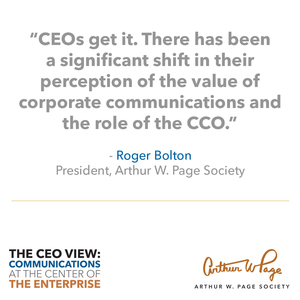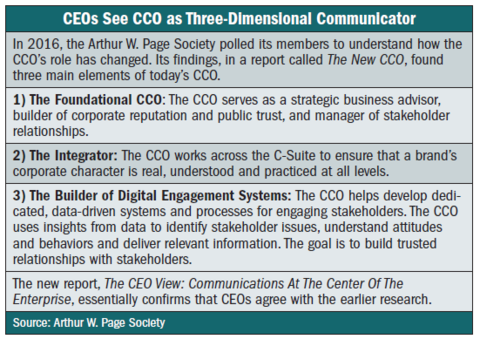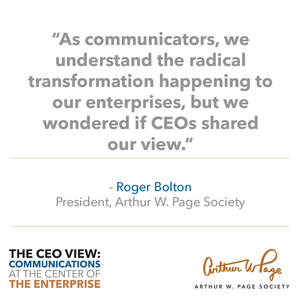- blog
- CCO
CEOs get it. There has been a significant shift in their perception of the value of corporate communications and the role of the chief communications officer (CCO).

CEOs increasingly are relying on CCOs not just for occasional counsel and advice, but also as key leaders and contributors playing a critical role alongside other C-Suite members in creating and implementing company-wide strategy.
Studies from the Arthur W. Page Society found communications to be an embryonic part of CEO thinking about company strategy (2007), and then, later, an important contributor (2013).
Findings in the Arthur W. Page Society's The CEO View: Communications at the Center of the Enterprise (2017) show CEOs now also view the CCO as a key driver of corporate character.
In the view of CEOs, the CCO should function as an integrator across the enterprise to ensure that corporate character—its unique and differentiated identity—is defined, permeates the entire company and is consistently practiced and communicated at all levels.
Similar to earlier Page research mentioned above, the new report consists of phone interviews with 24 CEOs of member companies from a variety of industries and revenue levels. The interviews were conducted between November 2016 and January 2017.

Owing to this CEO view of the importance of the role, many CEOs now require their CCO to have total business knowledge—from strategy to operations—in order to provide strategic input on issues that span business functions.
CEOs also want their CCOs to proactively identify and mitigate risks before they become threats by shaping stakeholders' engagement in the brand.
The results in this report are encouraging for those of us who believe that a CCO who functions as an effective senior strategic leader is able to help her enterprise build the corporate character and stakeholder relationships that create enduring value, not only for customers and shareholders, but for society, as well.
In earlier studies CEOs acknowledged the importance of social value as manifested in corporate social responsibility, but didn't view it as a key component of communications or top of mind when thinking about strategy.
In 2017, they believe it should be baked into the business plan and integrated into the enterprise's mission and strategy. CEOs want all stakeholders to know that the enterprise is making a positive difference in the communities in which it operates.
The report highlights other key ways in which CCOs are proving essential in the C-suite:
As communicators, we understand the radical transformation happening to our roles and to our enterprises, but we wondered if CEOs shared our view. The results are clear: CEOs see more value than ever in corporate communications and the role of the CCO.

This article originally appeared in PR News.